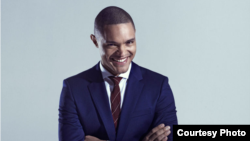When I first heard South Africa’s most beloved comic, Trevor Noah, was going to take the helm from Jon Stewart at The Daily Show, I checked the date. No, it wasn’t April 1, April Fool’s Day. It was real.
Surely, I thought, people are joking when they ask if America is “ready” for Trevor Noah. Is the United States - recently riven by race-related violence in Ferguson, Missouri and race scandals at top universities - ready to talk about race?
How can we not be, when mixed-race Americans are the fastest growing demographic in the country, with a 32 percent increase in the last census? How can we not be when the mayor of Houston, my hometown and the fourth-largest city in the nation, proudly told me that one in five Houstonians is foreign-born?
In ways that increasingly more Americans can identify with, Trevor Noah is like many Americans. His struggles with identity are our struggles with identity. And South Africa’s 21-year-transition from apartheid to the (admittedly imperfect) rainbow nation is not that different from the U.S.’s struggle for equality.
More importantly, however, Noah’s way of dealing with his struggle -- with words and humor -- follows the very American tradition of Mark Twain and Benjamin Franklin. Two very serious and respected Americans who used humor to poke at their society’s problems.
I’m American, but I live in South Africa. And like Trevor Noah. I am of mixed race. During my 14 years living in the United States, my race was a regular topic of conversation in my interactions with fellow Americans.
When Noah joked about being addressed by strangers in Spanish, I chuckled -- that happens to me regularly when I visit family in Texas.
When he talked about being "born a crime” to parents of two different races in apartheid-era South Africa, I’m reminded of what my mother said was her first reaction upon seeing my newborn pale skin, wispy blonde hair and blue eyes.
“That’s not my baby,” said my mother, a doctor who had delivered countless squalling, dark-skinned, black-haired babies in her native India. “Take it away and bring me MY baby.”
And I think many people can relate to Noah’s experience of being held to two simultaneous sets of standards. He has described the weird feeling of never being black enough or white enough -- as if one human being could, or should, try to meet two different sets of rules at once.
Sound familiar?
The U.S. ambassador to South Africa, Patrick Gaspard, was among the countless numbers of people around the world who welcomed the announcement of Noah’s promotion. He tweeted:
I was at a talk with the normally cheerful ambassador earlier this year. In a rare, raw moment, he spoke about growing up in New York City and going to an elite school, where he was one of a few black students there. His voice grew thick as he talked about being stopped by a white police officer who refused to believe he was a student, and tore up his subway pass. It took him hours to walk home.
These things are hard to talk about. That’s where comedy comes in -- gently poking at our frailties, taking apart our imaginary walls, uniting us through laughter.
The morning after South African social media exploded, I caught up with two members of South Africa’s comedy community. I was expecting jokes -- and I was honestly disappointed when comic Deep Fried Man (real name, Daniel Friedman) refused to humor me with an impromptu version of one of the satirical songs he’s known for in his role on Late Night News with Loyiso Gola, the South African version of The Daily Show.
Like Noah, Friedman often discusses race in his work, like this refrain from one of his particularly caustic ditties: “I’m scared this country’s turning into the next Zimbabwe, so I spent my time looking for clues - I think I’ve got a bad, bad case of them white South African blues.”
But this is serious, Friedman told me.
“One thing that’s very interesting to me is that already there’s been a backlash over his Tweets …and I read the Tweets, and they are Tweets that by South African standards are pretty mild,” he said. “I think we have, if anything, a very confrontational style of comedy here and we’re allowed to get away with whatever we want. Trevor is already, in person, a lot more than on Twitter, very able to discuss difficult concepts in a non-offensive way. And he’s so charming that he can pretty much go anywhere. But I think his biggest challenge is going to be pretty much that the U.S. has a lower threshold for controversial comedy than we do.”
The show’s content producer, Karabo Lediga, said she thinks Noah is well-equipped to talk about race on American television.
“I think America has its own race issues to talk about,” she said. “So maybe it’s not such a bad thing.”
And, she said, she hopes that Noah can finally overturn the world’s perception of Africa as a hopeless, backwards place -- something he has also brought up in his comedy routines.
“For Trevor in that spot, that amazing, particular spot, it just means a better opportunity for us to be normal, like everybody else around the world,” Lediga said. “And I think that for me is the most powerful thing about this.”
If there is anyone who can find humor in this, it’s probably Trevor Noah.




